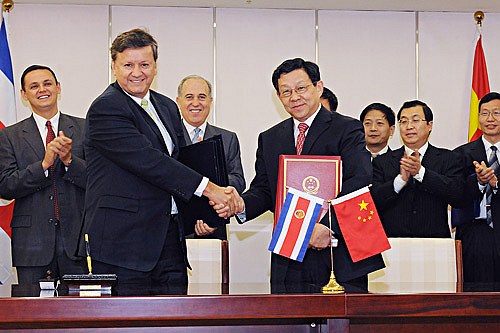|
 |
|
PARTNERSHIP: Chinese Commerce Minister Chen Deming (right) and his Costa Rican counterpart Marco Ruiz shake hands after signing a Free Trade Agreement in Beijing on April 8. The agreement was the first free-trade pact inked between China and a Central American country (HE JUNCHANG) |
Educating Officials
Chinese President Hu Jintao vowed to further improve the capabilities of officials in guiding development in a scientific way, as an 18-month nationwide study campaign of the Communist Party of China (CPC) drew to a close on April 6.
Hu hailed the campaign for implementing the Scientific Outlook on Development as "effective" while delivering the keynote speech at a conference that marked the campaign's conclusion.
In order to further implement the Scientific Outlook on Development, it is crucial that the capability of officials be enhanced, to lead and promote development in their jurisdiction in a scientific way, he said.
The recently-concluded campaign focused on educating officials above the county-level.
Hu said that the CPC would draw on the experience of the campaign to strengthen education and training of officials in future, and to improve their capabilities in planning and promoting development, providing public services, and maintaining social stability.
Information Security
China's Central Military Commission has issued a set of guidelines aimed at developing a comprehensive system for upgrading military information security, according to a statement from the commission on April 5.
The Guidelines on Enhancing Military Information Security under New Situations, which have been approved by Hu Jintao, the chairman of the Central Military Comission, set out an overall arrangement for advancing military information security work by "tackling critical issues" facing China's armed forces.
Improvement of military information security is a requirement for the modernization of China's national defense and military buildup, said the guidelines.
The document stressed the importance of enhancing organizational bodies, working mechanisms, and specialized personnel and technical safety, in order to achieve improved information security in the ranks. It gives priority to network security and electromagnetic safety as two major working areas amongst others.
Military officers and soldiers should receive proper training to prepare for military information security in new circumstances, said the guidelines.
Cybercafes Rules
China's internet cafe operators will face tougher penalties for allowing minors to frequent their premises, according a circular issued by the Ministry of Culture in Beijing on April 7.
According to the new rules, an internet cafe must suspend operation for 30 days if it is found providing services to a minor, which is defined as an individual below 18 years of age. If such a violation occurs twice within a year, the license of the internet cafe will be completely revoked.
China banned Internet cafes from providing services to minors in 2002, in the wake of a series of internet cafe accidents and an increasing number of teenagers addicted to online gaming.
Work Safety
China launched a two-month campaign to inspect work safety nationwide on April 5, according to the Work Safety Commission of China's State Council.
Serious accidents, which have recently occurred with greater frequency in a number of areas and industries, display negligence and loopholes in work safety management, and serious violations of laws and regulations, said a circular issued by the commission.
The inspection would focus on work safety in mines, the chemical industry, transportation and fireworks factories, amongst others.
The campaign would include self-examination by enterprises, government inspection and public supervision.
Enterprises are required to complete self-examination in April and local governments to conduct inspection in May, while the commission will dispatch supervision teams to check their work. | 